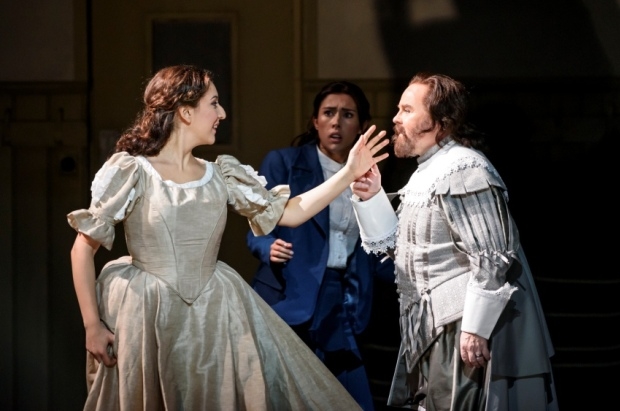I puritani (Wales Millennium Centre – tour)

© Bill Cooper
I puritani, Bellini's final opera before illness claimed him at 34, contains music of blissful bel canto sweep and surprising power, but it's saddled with an intractable, lettuce-limp libretto by Carlo Pepoli and so rarely gets an outing nowadays. With its two-dimensional politics, a heroine who dips conveniently in and out of madness and a perfunctory happy ending, the opera's dramatic form is deeply unsatisfying. Miskimmon understands this, and by some alchemy in this new production for Welsh National Opera she manages to inject truth, tragedy and theatrical excitement into a stale tale.
Circa 1975, preparations are under way for a Protestant Orange Parade. Elvira, the commander's daughter, is secretly in love with the Catholic Arturo. So far, so foursquare… except that Elvira, much earlier in proceedings than Bellini or Pepoli envisaged, is prone to psychotic episodes. And she's stopped taking her tablets, so by the time designer Leslie Travers unleashes his brilliantly simple coup de théâtre she's in a bit of a state.
There's a big risk of spoilers here, although the photo above gives some of the game away. Suffice to say that Elvira's madness triggers a delusion in which she watches a 17th-century romance with herself as the disturbed lead — a folie à deux, Walter Mitty style. With one ingenious stroke Miskimmon turns a poor story into compelling drama by invoking Madame Bovary, Inception and the Northern Ireland troubles.
'Wrings the emotions'
Musically too, this is a magical evening. Rosa Feola (whom we shortlisted as 2015 Breakthrough Artist in the WhatsOnStage Opera Poll for her appearance in La finta giardiniera on the Glyndebourne Tour) effaces all memories of Maria Callas and Joan Sutherland by singing a soaring, secure, beautiful and vulnerable Elvira. Feola leaves the production on 20 October; do try to catch her before then. She will make you giddy. In act two (distorted and dimly lit as Travers and Miskimmon bring music to the fore) she breaks the heart in her mad scene, "O rendetemi la speme".
The redoubtable bel canto tenor Barry Banks is in heroic form as her lover, and if Miskimmon's twist to Arturo's final scene is a mite predictable he still wrings the emotions as he should. David Kempster is a gruff Riccardo, his Protestant rival for Elvira's affections, and Wojtek Gierlach a contrastingly mellifluous Giorgio, his sympathetic adjutant. There is excellent work, too, from Aidan Smith as Elvira's father and from actress Elena Thomas as her silent alter ego.
Beyond praise, needless to say, are the WNO Orchestra and Chorus under Carlo Rizzi's dynamic baton. WNO's totemic maestro's pliant orchestral phrasing in the relatively flat third act, heralded by a melting offstage harp solo from Katherine Thomas, turns Bellini's rum-ti-tum into noble scoring.
As a company achievement this I puritani will take some beating. If you're planning to see it, find out all you can about the opera beforehand and as little as possible about the production.
Welsh National Opera's production of I puritani plays in repertoire at the Wales Millennium Centre in Cardiff until 4 October, then tours to Southampton, Bristol, Llandudno, Oxford and Birmingham.











